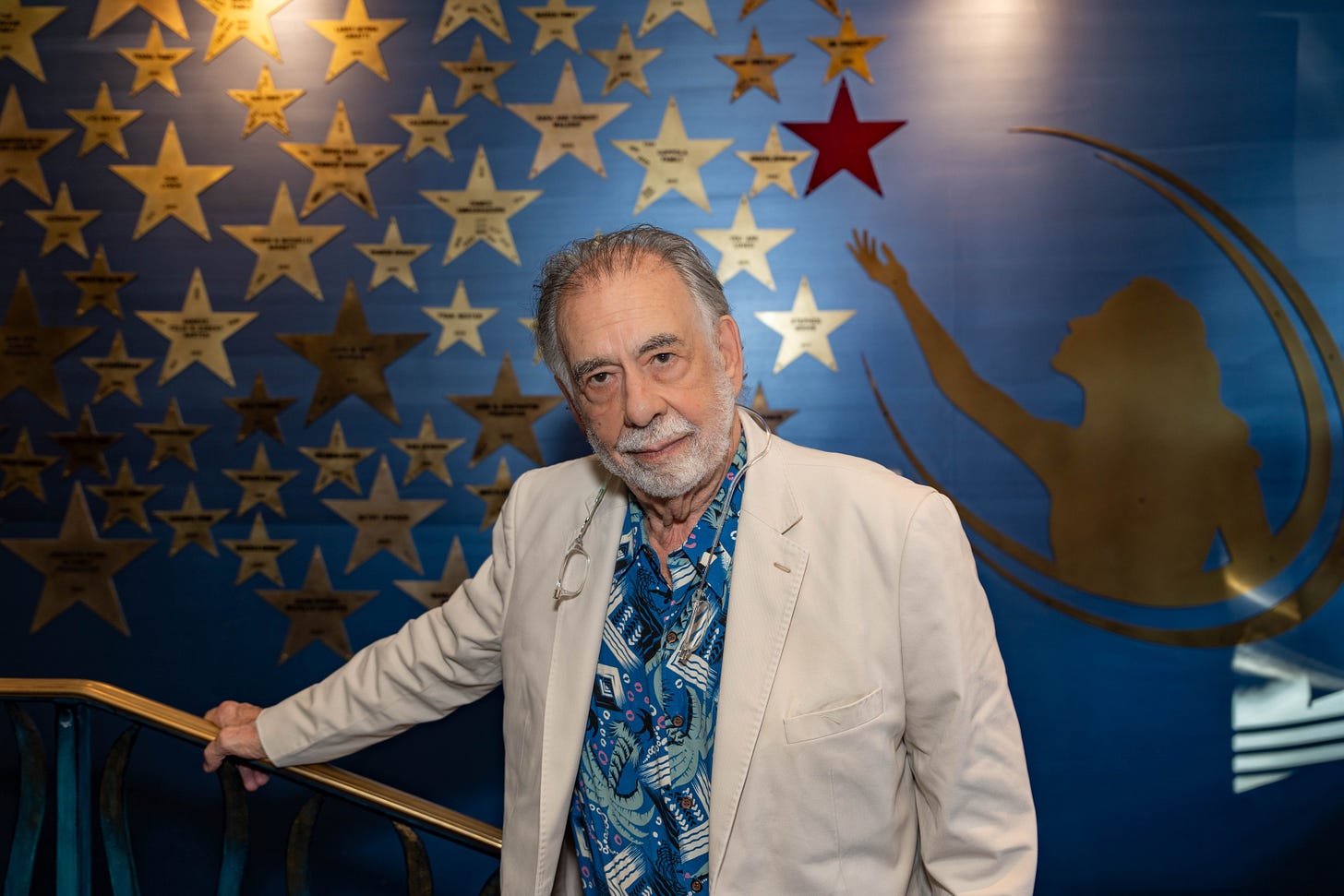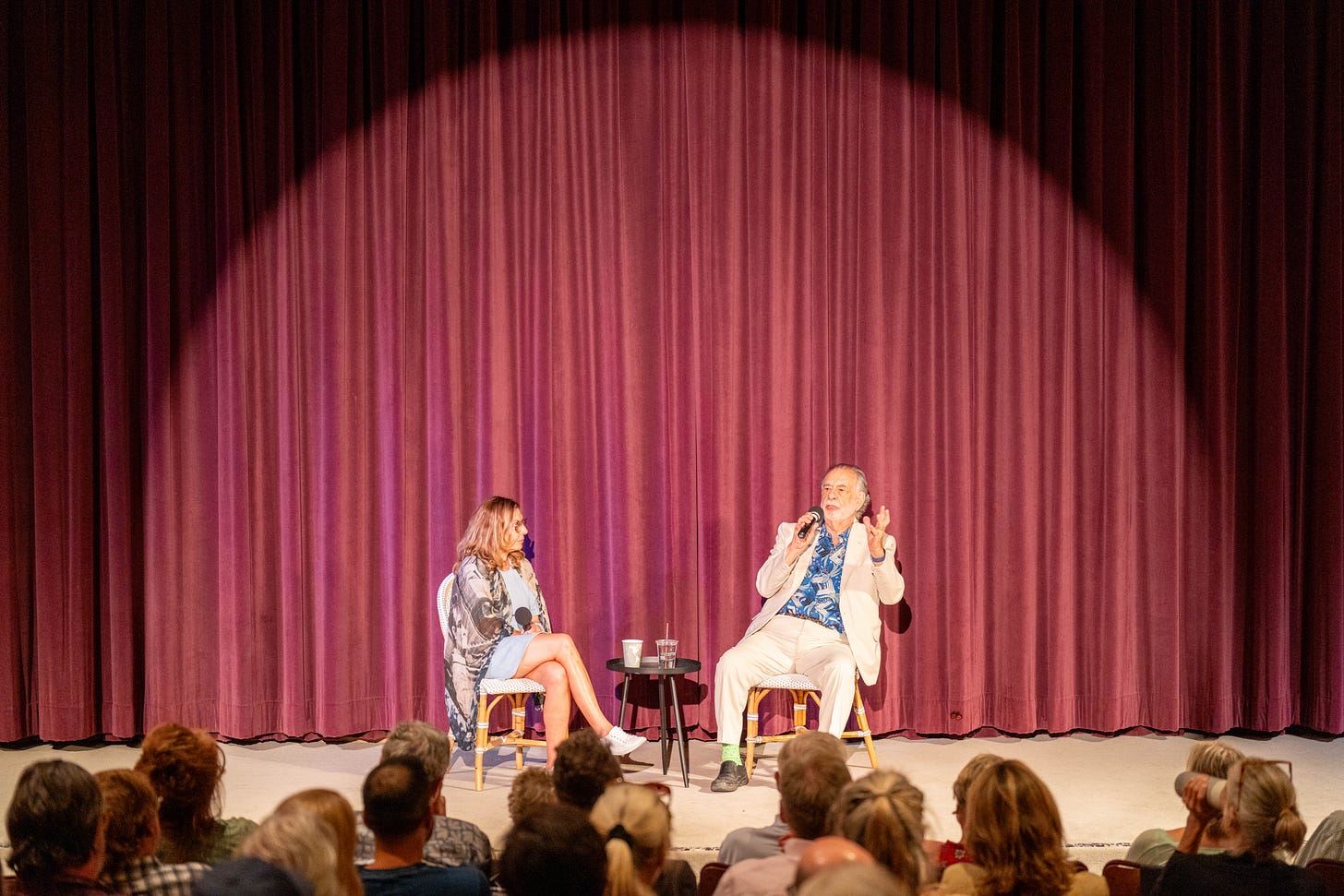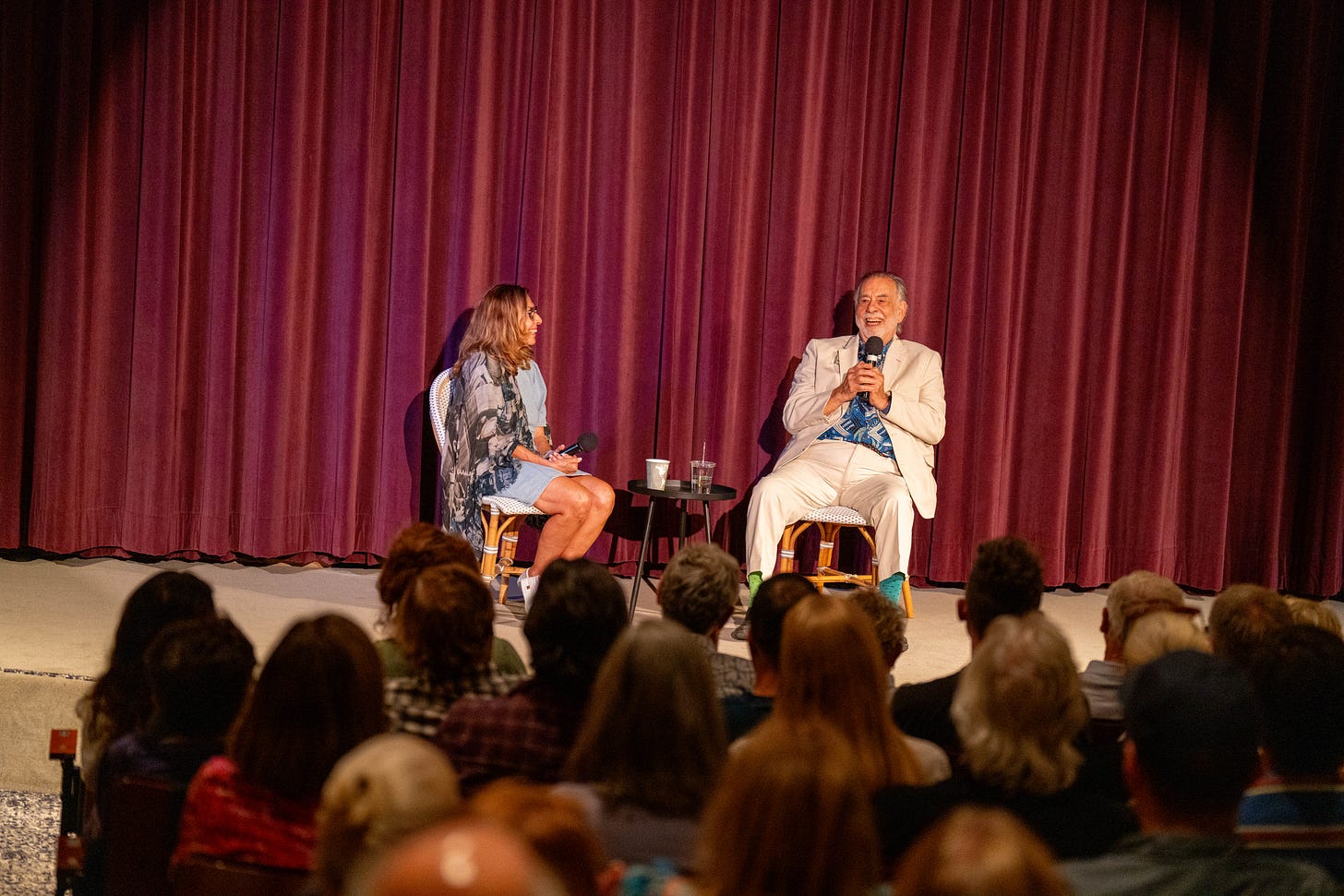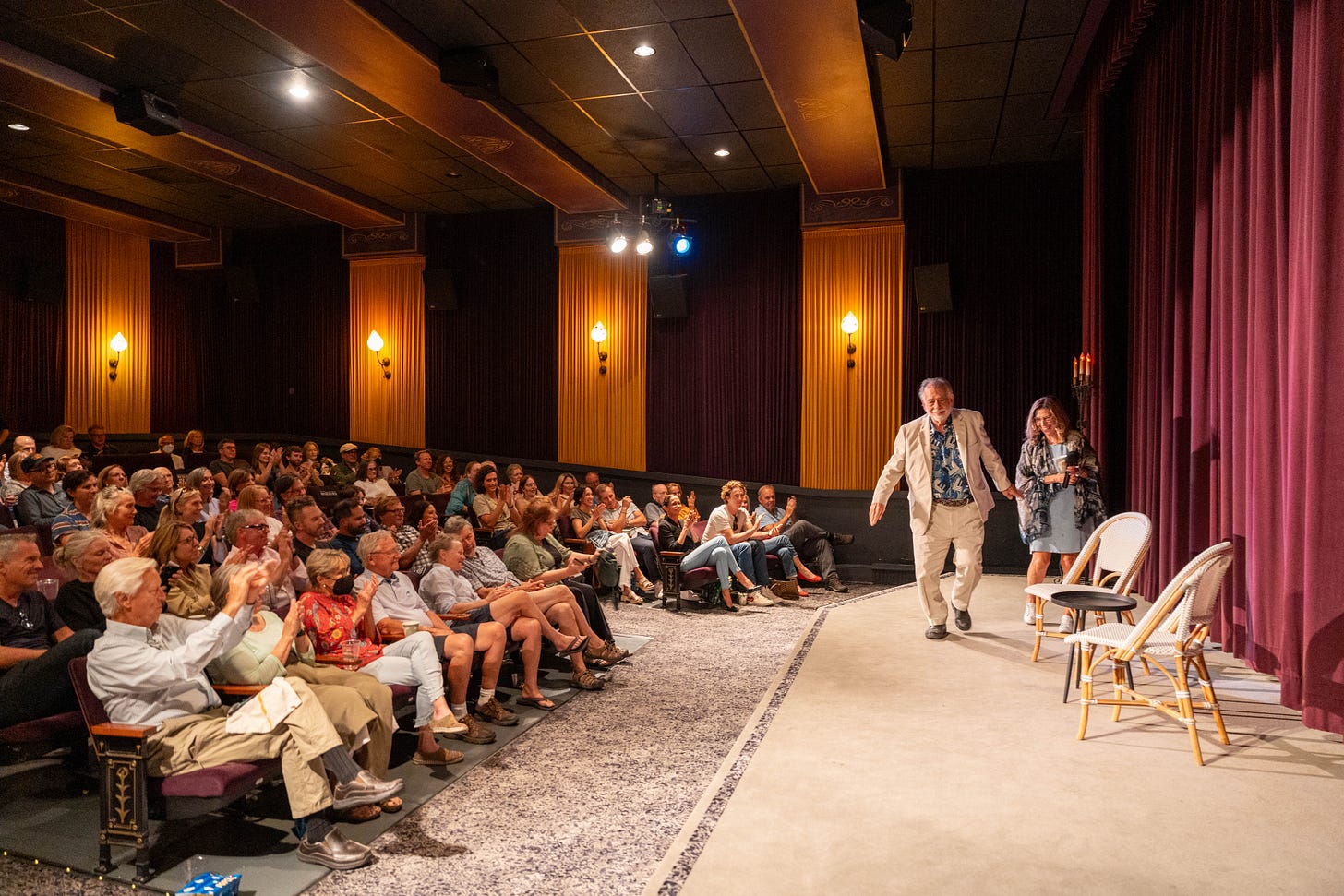ST. HELENA, Calif. — On Tuesday, Aug. 20, a sold-out crowd filled the historic Cameo Cinema to celebrate the 50th anniversary of “The Conversation,” Francis Ford Coppola's acclaimed thriller, and to hear the legendary director reflect on his storied career. Coppola, who lives just a few miles south in Rutherford, considers the Cameo his hometown venue — a place where he feels at home among friends and neighbors. During the event, moderated by cinema proprietor Cathy Buck, Coppola shared personal anecdotes and insights into his creative process and announced plans to host another discussion later this year, when his highly anticipated new film, “Megalopolis,” is released.
A Life-Altering Encounter With Cinema
Coppola began by recounting his early days as a student of theater, where he initially planned to attend Yale's graduate program, then regarded as the pinnacle of theater education. However, his trajectory changed dramatically after he watched Sergei Eisenstein's four-hour epic “October: Ten Days That Shook the World.” The Russian director's groundbreaking use of film as a medium for political and artistic expression left an unshakable mark on Coppola, who recalled thinking, "That's what I want to do." This moment of clarity set him on a path that would lead to his becoming one of the most influential directors in cinema history.
"We drop fire from the sky on people's heads, but we're not allowed to write 'f**k' on the side of a plane. That's our morality."
— Francis Ford Coppola
The Power of a Single Word
Throughout his career, Coppola has approached each of his films with a singular focus, distilling their complex themes into a single word. He shared three examples during the evening: "privacy" for “The Conversation,” "succession" for “The Godfather” and "morality" for “Apocalypse Now.” This method, Coppola explained, helps him maintain a clear vision throughout the filmmaking process, guiding every decision from scriptwriting to final edits.
When discussing “Apocalypse Now,” Coppola referenced a memorable quote attributed to a military officer during the Vietnam War.
“We drop fire from the sky on people's heads, but we're not allowed to write 'f**k' on the side of a plane. That's our morality,” he said.
This stark contrast between the horrors of war and societal taboos encapsulated the moral ambiguity he sought to explore in the film.
A Day That Changed Everything
Coppola also reminisced about a day that forever altered his career and life. At the time he was living in a modest San Francisco apartment on Webster Street with his pregnant wife Eleanor and their two young sons. One morning, he opened the newspaper to find an advertisement for Mario Puzo's novel “The Godfather.” Unfamiliar with both Puzo and the book, Coppola was intrigued but had no idea how pivotal it would become.
Later that day he received a phone call from Marlon Brando, one of his cinematic idols and a member of what Coppola referred to as his "trinity" of great artists, alongside Elia Kazan and Tennessee Williams. Brando expressed interest in working with Coppola but declined the lead role in “The Conversation.” The role ultimately went to Gene Hackman, whose performance was widely praised and remains one of the standout achievements of his career. On that same day, two Paramount producers, Gray Frederickson and Fred Roos, knocked on Coppola's door. Though they claimed to be in town for unrelated business, they would later become key figures in the production of “The Godfather.”
“The Conversation" went on to win the top prize at the Cannes Film Festival and was nominated for best picture at the 1975 Academy Awards, where it competed against another of Coppola's masterpieces, "The Godfather Part II," which ultimately took home the award.
The First Screening and an Unexpected Insight
Coppola shared a behind-the-scenes look at the creation of “The Conversation,” revealing that he wrote the screenplay by dictating it into a recording device and hiring a court stenographer to transcribe the dialogue. Interestingly, the main character's name was originally Harry Call, but the stenographer misheard it as Harry Caul — a mistake that Coppola found more fitting and decided to keep.
He also recounted the film's first unofficial screening, which took place in his own home. His teenage babysitter and her friend happened to be present and became the impromptu audience. Their enthusiastic response and insightful observations provided Coppola with his first indication that he might have created something special.
Unconventional Casting and a Bet With Paramount
Coppola's approach to casting has always been unconventional. For “The Godfather,” he employed a variety of techniques, ranging from traditional auditions to open calls where anyone, professional or not, could try out. This method led to the casting of Abe Vigoda as Tessio and another actor as the suppliant Italian man who requests a favor from Don Corleone in the film's early scenes.
During the filming of “The Godfather,” Coppola and his family lived with his sister Talia's family in New York, scraping by on a tight budget. Despite the film's eventual success, the production was far from smooth. However, the film's box-office success brought a small reward for Coppola. After making a bet with Paramount that if the film grossed over $75 million they would buy him a car, Coppola found himself in a Mercedes showroom with George Lucas. The two bearded young customers were overlooked by the older salesmen on the lot, and were passed on to a newer, younger salesman. In the end, Coppola drove off in the six-door Mercedes—a blue luxury car that later appeared in the final scene of “The Conversation.”
Reflections on Artistic Legacy
Coppola reflected on artists who were not fully appreciated during their lifetimes, such as painter Henri Rousseau and filmmaker Jacques Tati, drawing parallels to his own experience with "Apocalypse Now." Despite winning the Palme d'or at Cannes, the film initially received mixed reviews, leaving Coppola disheartened. However, as time passed, "Apocalypse Now" gained recognition as a cinematic masterpiece, ultimately offering him a deep sense of validation.
He concluded by offering advice to aspiring filmmakers, including his daughter Sofia and granddaughter Gia, emphasizing the importance of creating personal, unique stories. "We're all unique and we have unique stories to tell," Coppola said. "There will be nothing else like them."
Looking Ahead
The evening at Cameo Cinema was a rare opportunity for fans to hear firsthand accounts from one of cinema's greats, in a setting as intimate as St. Helena’s beloved venue. As the night drew to a close, Coppola confirmed that he plans to return to the Cameo later this year for another discussion, this time centered around his newest film, “Megalopolis.” Audiences can look forward to another evening filled with insights, stories and the distinctive vision that has defined Coppola's extraordinary career.
This article was greatly supported by Napa Valley Features subscriber Sam Chapman.
If today’s story captured your interest, explore these related articles:
Weekender Encore: Nature’s Sweet Treasure — The Blackberries of Napa Valley
Weekender Encore: The Napa Valley Writers’ Conference Starts Soon
Tim Carl is a Napa Valley-based photojournalist.











Thank you for the feature article on Francis Ford Coppola. I enjoyed his movies.